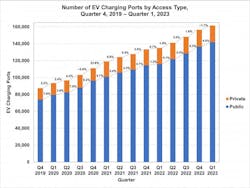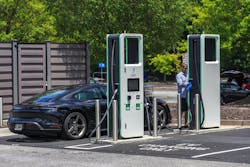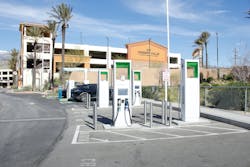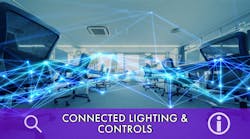As electric vehicle (EV) adoption accelerates across the U.S., the EV charging market is powering up — with a projected annual compounded growth rate of 29.1% between 2023 and 2030. Leveraging their business experience and industry partnerships, some lighting and controls companies are expanding their product lines to capitalize on the opportunity.
According to Cox Automotive, EV sales surpassed 300,000 (7.9% of total industry sales) for the first time in the third quarter of 2023, and total EV sales will pass 1 million this year. Those numbers are expected to rise exponentially in the coming years, with the Biden administration calling for EVs to account for more than 50% of vehicle sales by 2030 — effectively transforming the transportation sector.
But data from the Pew Research Center indicates that drivers will be reluctant to switch to EVs without widely accessible and reliable charging options both at home and in public. According to the U.S. Department of Energy’s Office of Energy Efficiency & Renewable Energy, just 161,562 public and private charging stations were in place nationwide by end of the first quarter of 2023. S&P Global reports that by 2030, the U.S. will need more than 2 million public charging stations alone.
Recognizing this, the Biden administration included $7.5 billion for the construction of a national EV charging network in the 2021 bipartisan Infrastructure Investment and Jobs Act. The Federal Highway Administration began distributing these funds to states in 2022 and will continue to do so annually through 2026 under the National Electric Vehicle Infrastructure Formula Program.
With funds flowing, the next step is to build out the network. That’s where lighting and controls companies are coming in. LEDs Magazine spoke with three companies from across the U.S. that have entered the EV charging market to learn about their experiences in this burgeoning field.
Identifying the opportunity
As the government has intensified its push to increase EV sales and vehicle manufacturers have released more EV options, many of the lighting and controls companies that have entered the EV charging market have done so relatively recently.
One of those is Espen Technology, a California-based manufacturer of interior LED retrofit solutions in the linear lighting space. Founded in 2008, the privately owned company began investigating EV charging about four years ago. At that time, several of the energy service companies (ESCOs) that it works with became heavily involved in EV charging and recommended that Espen do the same.
“Some of our major customers were encouraging us to take the step because they felt that if they were in a facility, working in the interior space with an Espen product and they were doing EV installations outside, it would be very simple for them to have one supply contract,” said Flemming Jensen, senior vice president of sales and marketing at Espen. “So, two years ago, we took the step and got into it.”
Wisconsin-based Orion Energy Systems is another lighting and controls company that recently entered the EV charging market. For Orion — which began in 1996 as a privately held company focused on fluorescents, went public in 2007, and then shifted its focus to LEDs with the acquisition of Harris LEDs in 2013 — entering the EV charging market was the next phase in its evolving story.
“We were looking for ways to continue that growth and diversify the business into new areas,” Orion CEO Mike Jenkins explained. “EV was on our radar, but we really began to explore it in early 2022. We saw this as an opportunity to leverage our deep knowledge of electrical systems, our national account customers, and our broadening base of ESCOs and agents to move into this area.”
While companies like Espen and Orion are new to EV charging, New York–based Leviton has been working in the space for more than a dozen years. Leviton, which has manufacturing facilities around the world and distribution centers across the U.S., Canada, Mexico, and Latin America, entered the market through its relationships with automotive manufacturers — many of whom reached out to the 117-year-old company about making EV chargers.
“We started […] manufacturing chargers for automotive partners, the Toyotas of the world, even Honda and Ford,” said Andrew Taddoni, director of business development and product management for EV charging at Leviton. “We worked directly with them to come out with EV charging solutions for the very early-on EVs that were being produced.”
Moving into the market
Once they made the decision to get into EV charging, these lighting and control companies took different avenues to enter the market.
For instance, Espen talked to its closest customers to learn everything it could about EV charging. It then leveraged the owner’s personal connections in China and Taiwan to partner with experienced hardware and software manufacturers to produce its own product line. “They don’t sell it under their own name, but they manufacture it for other people,” Jensen explains.
At Orion, the company entered the EV charging market in 2022 through the acquisition of Massachusetts-based Voltrek, which designs, installs, and services EV charging stations. Jenkins said Orion was attracted to Voltrek because it was a profitable business with a shared commitment to project management. “We did a fairly exhaustive search and talked to a number of companies that were in the space, and that’s when we found [president] Kathleen [Connors] and Voltrek,” he says. “We feel very fortunate that we did.”
At Leviton, entering the EV charging market has been a natural evolution of its partnership with automotive manufacturers. The company leverages the experience it gained working with automakers to also manufacture chargers for both the residential and commercial markets. “It took several years to really get this going, but we’ve stayed in it […] and grew our portfolio,” Taddoni says.
Engineering relationships
While lighting and control companies need specific design and manufacturing capabilities to be successful in EV charging, a lot of synergy exists between the two markets — much of which can be found in their existing relationships with customers and other partners. “From a product perspective, it’s dramatically different, not a whole lot translates from one to the other,” Jensen said. “But it’s the relationships and the services that are required by the people doing EV versus people doing lighting that are very much the same.”
For Espen, its most beneficial relationships have been with ESCO customers, some of which, Jensen noted, have found a way to incorporate EV chargers into building performance contracts. “Probably 98% of the customers we have in the EV space are the same people we’ve been doing business with for years in the LED energy-saving lighting space,” he said. “So, it’s been a good move for us.”
Orion has also found that its existing ESCO relationships have been helpful in growing its EV charging business. Jenkins said that Orion is already working with these companies on building layouts, technology selections, and electrical system issues, so it makes sense to also work with them on EV charging. “The common thread is that we’re really working on electrical systems,” he explains. “Our clients are coming to us based on our expertise in this area.”
Like the others, Leviton is also leaning into its existing customer relationships to capture market share. The company is already a well-known brand in both the residential and commercial markets, so it’s focused on getting existing customers to add another Leviton product to their portfolio in the form of EV chargers. “It can go into the package of verticals in the markets that we’re targeting,” Taddoni said.
In addition to relationships, Leviton is also leveraging its existing production capabilities to compete in the market. With manufacturing facilities worldwide, the company is focused on building its inventory to meet the ballooning demand for EV charging. “We’re now in a position where we’re designing new products, we’re quickly getting to market, and most importantly, we have the inventory in place to deliver 10 chargers to a site, if needed, or 1,000,” said Taddoni, noting that orders of that magnitude are a reality.
The road ahead
With so much growth expected in the EV charging market over the coming years, plenty of opportunity exists for more lighting and controls companies to get involved. Chargers are needed in both the residential sector, as practically all drivers will want the ability to charge their EVs at home, and the commercial sector, as places from offices to public shopping districts will want chargers to attract employees and customers.
In the commercial sector specifically, Taddoni expects that one of the hottest markets will be multiple dwelling units (MDUs), such as apartment complexes, in part because codes are being passed that require them to install a certain number of chargers to accommodate their residents. “Those communities want a lot of chargers,” he said. “[MDUs] are going up all over the place, and the ones that are already in place, of course, are looking to retrofit and add some chargers to their locations.”
While the EV charging sector offers a lot of opportunity, success is not guaranteed. The market is continuously evolving and major competitors, such as Tesla, are known to announce new advancements that can cause significant disruption overnight. Taddoni noted that companies that get involved in the market must stay on top of what is happening today while remaining nimble enough to address what happens tomorrow.
Despite the necessary work to compete, Jensen said, the investment is worth it. “Do your homework, do your legwork, and know that although you are an absolute expert in lighting, you will find that you are a total novice in this space,” he said, adding that’s part of what makes it exciting. “The last two years of doing this EV gig has been more fun for me than I’ve had in a long time in this business.”
JENNY JONES is an award-winning freelance writer based in Northern Virginia. She has more than 20 years of editorial experience and specializes in making complex subjects clear and engaging.
Follow our LinkedIn page for our latest news updates, contributed articles, and commentary, and our Facebook page for events announcements and more. You can also find us on the X platform.









